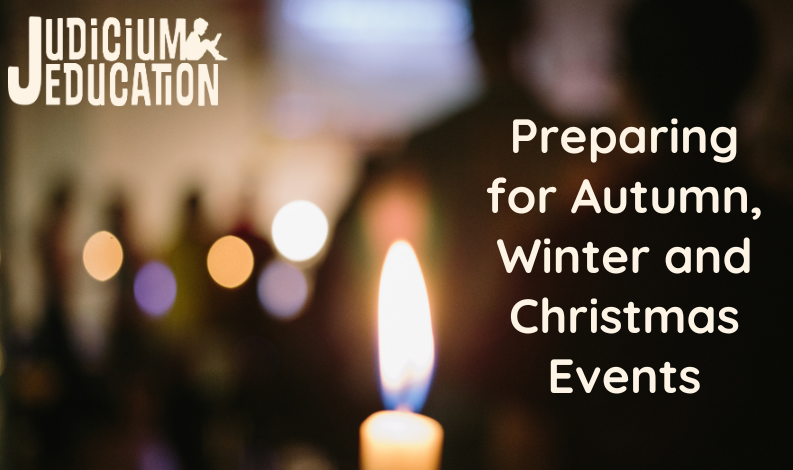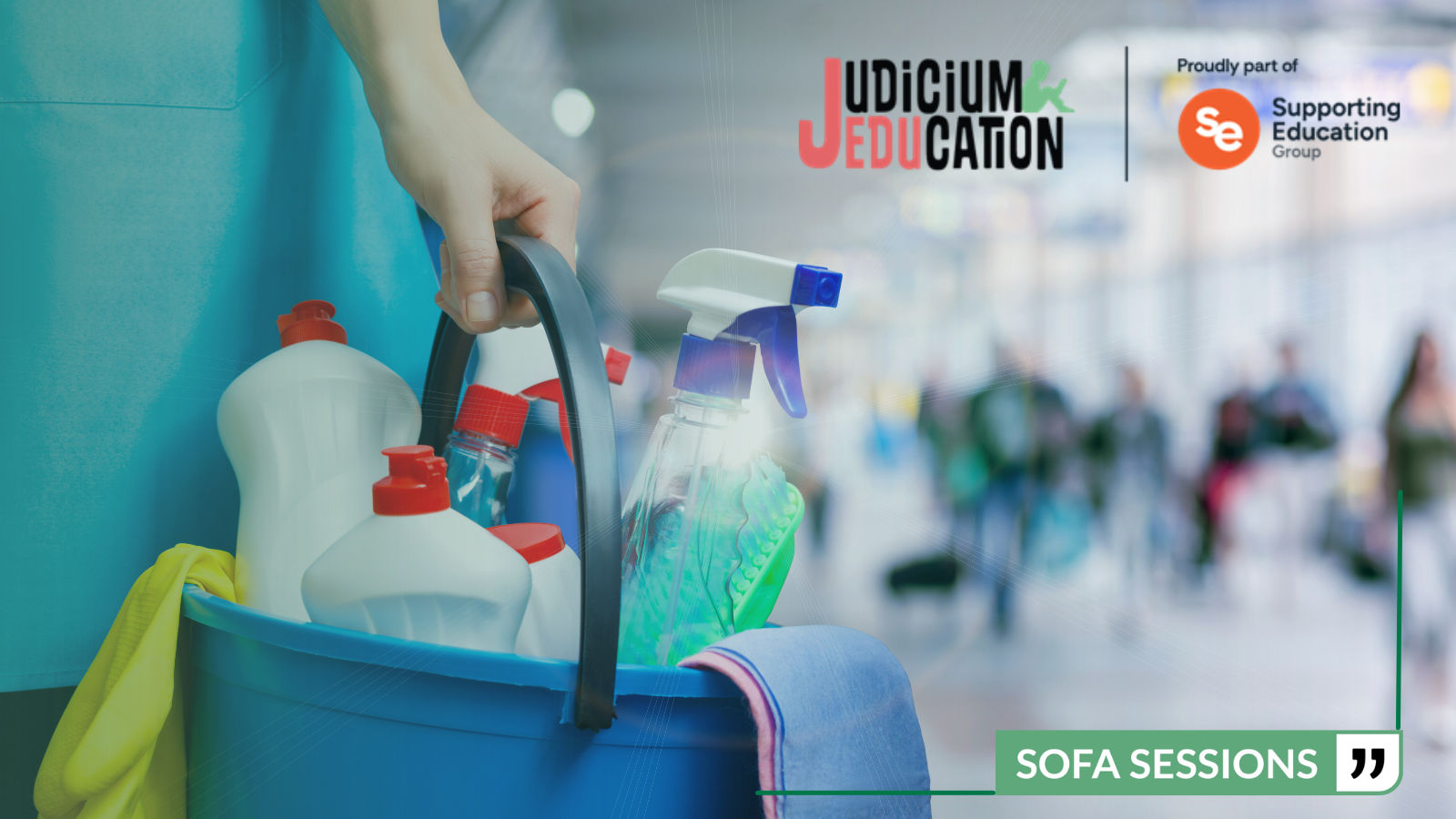Preparing for Autumn, Winter and Christmas Events – How to Prevent an HSE Prosecution in your School

This blog is based on Judicium’s Health and Safety ‘Sofa Session’ from the 4th of October, with our resident experts Rachel Sharman, CMIOSH, and Morne Landman, Grad IOSH. This session focused on a case study of the HSE prosecution case fining a school in June 2023, your duties under the Health and Safety at Work etc. Act 1974, the increased risks during Autumn, Winter, and Christmas Festivals, including flammables, fairy lights, allergies, winter weather, etc., using candles safely, and the five key takeaways on ensuring safe festival celebrations in schools.
What Events Occur to Celebrate Autumn, Winter and Christmas in Schools
- Halloween - Tuesday 31st October 2023
- Dia de los Muertos – 1st & 2nd November 2023
- Bonfire Night Celebrations – Sunday, 5th November 2023
- Diwali Celebrations – Sunday, 12th November 2023
- Carol Service – Anytime during December
- Christingle – Between Advent (4 weeks prior to Christmas Day)
- Candlemas - 2nd February
- Hanukkah - 7th to 14th December 2023
- Advent Fasting – 12th December 2023
- Winter Solstice – Friday, 22nd December 2023
- Guru Gobind Singh Ji’s Gurpurab (December 2023/January 2024).
- Nativity and Pantomime Season – Various Dates December to January
Case Study: School fined £35,000 after a child was severely burned at a Carol concert
A London primary school was found guilty after a trial following an incident where a child received 45 per cent burns to their body at a Carol concert. The school was fined £35,000 and ordered to pay £25,970 in costs.
During the Carol concert in December 2019, 60 Year 3 children from the school were waiting in costume, in a narrow corridor, holding 10-inch lit taper candles. As they were waiting, a seven-year-old boy wearing a homemade sheep costume made out of cotton wool balls, caught fire.
The fire was extinguished with some difficulty and the child received first aid at the scene before being taken by air ambulance to hospital. The pupil sustained an estimated 45 per cent burns to their body.
An investigation by the Health and Safety Executive (HSE) found that the school had failed to take appropriate measures to account for the risks inherent with giving lit candles to children while wearing potentially flammable costumes.
The injuries sustained by the boy require ongoing, regular, invasive surgeries throughout his youth and into adulthood and are life-changing for him and his family.
The school pleaded not guilty to breaching Section 3(1) of the Health and Safety at Work etc. Act but were found guilty by a jury at Southwark Crown Court on 19 June 2023.
The HSE Inspector Sarah Whittle said: “This was a shocking and scary incident that could have so easily been avoided.
“Common sense alone should have been enough to see the risk. Mitigation in this case would have been the substitution of wax candles for flameless ones, thereby reducing the risk to zero. This was a step the school took after the incident but by then it was far too late for a young child who will be forever affected by this.
“The importance of a suitable and sufficient risk assessment has never been made so clear.”
Section 3(1) of the Health and Safety at Work etc. Act 1974
Under the Health and Safety at Work etc. Act 1974, there are general duties that employers and self-employed must undertake to persons other than their employees (members of the public whilst on their school premises/grounds) to ensure their safety and that they are not put at risk, from the activities undertaken by the school.
NB: Whilst most schools understand that they have a duty of care to their employees and pupils under H&S, they are not always aware of their duties to the public.
Winter and Christmas Festivals, Additional Flammables and Fairy Lights
These items may cause extra risks, which schools should be mindful of during these seasonal periods:
Flammables
- Bonfire Night – Bonfires and Fireworks
- Halloween - Pumpkins
- Christingle, Nativities, Classrooms, Offices, etc. - the alternatives can be used and provide safe options to light up.
- Christmas Costumes & Jumpers (Fire retardant in accordance with European standard EN71)
- Decorative Sprays/Glitters/Fake Snow - flammable COSHH products.
- Christmas Trees and Decorations.
- More hanging paper chains and decorations in classrooms, reception areas, halls and corridors, etc.
Fairy Lights
- Hidden away and not PAT tested or listed on the in-house visual checklist
- Left on 24/7 for aesthetics.
- Plugged-in vs. battery operated.
Christmas Allergens
- Party Foods - brought in items, mainly from home.
- Celebration Food – Christmas School Dinners and all the trimmings, Christingles food toppings.
- Natural winter/Christmas decorations (table wreaths, holly, ivy and other fauna).
- Chemicals - Decorative Sprays/Glitters/Fake Snow/Glues
- Christmas donkey and other visiting Christmas animals.
Top Tips for School Hall Occupancy
- Most schools have fire strategies in place which will give details for all your occupancy levels
- Consider seating arrangements – don’t obstruct fire exit doors or pathways, and consider decorations and how they can cause obstruction.
- NB: One fire exit means a maximum occupancy of 60 (no matter how big the area is).
- Carol concerts - review "ticket" numbers and don’t allow extras.
- Nativity plays - as above, utilising limiting tickets when necessary.
- PTFA Christmas Fayre – These can pose risks as often numbers are unknown until the event as they are not ticketed. They also tend to be held in the school hall in winter.
- NB: Ticketing an event does not necessarily mean it’s charged. You can utilise tickets simply for occupancy levels to be monitored.
- School Hall vs Community Hall or Church - Know the differences in your occupancy levels.
Winter Weather Conditions
Ensure you are prepared for:- Ice/snow -
- ensure gritting plans are in place and premises teams do walk throughs to check
- Check for outdoor lighting
- Use wet floor signage and have access to cleaning facilities
- Boiler breakdowns
- Minimum working temperatures of 16C
How to Use Candles Safely
Candles are one of the common causes of fires in the home and school.
Although they create a warm glow, candles need handling with care. Flameless LED candles are a much safer alternative to real candles or tea lights
It’s important to take extra care when you're celebrating. Diwali, Bonfire Night, Halloween and Christmas festivities can see the use of more lights and candles, dressing up activities, and displaying lots of decorations. These all can increase the risk of fire.
Top Tips:
- Make sure all your decorations are kept away from naked flames
- If you're celebrating with fancy dress, always check that costumes are fire retardant in accordance with European standard EN71-2.
- Did you know that many children's costumes are classed as toys? This means they don't have to be made to the same safety standards as regular clothes, and thus are a greater fire risk.
Benefits of flameless candles:
Sometimes called LED, battery-operated, or electric candles - flameless candles have a number of advantages:- You can leave them unattended
- You don't have to worry about pets or children knocking them over
- You can use them outdoors
- You can buy flickering, rechargeable, coloured and waterproof versions
How to use candles and incense safely:
If you don't want to switch to alternative versions, and continue to use wax candles, here are our recommendations on how you can use them safely:- Never leave candles, incense sticks and oil burners unattended. (This includes 'Diya lamps'' often used for worship and religious festivals.)
- Make sure you put them out when you leave the room.
- Keep them in heat-resistant holders placed on a stable surface.
- Don't put them close to anything that can catch fire, such as curtains, papers, furniture, and clothes.
- To avoid accidents, keep candles and all naked flames (including matches and lighters) out of the reach of children and pets.
- Tea lights get very hot and without proper holders can melt through plastic surfaces
What to do if clothes catch fire?
If there's an accident with a candle and your clothes catch fire, try to ‘stop, drop, roll.'- Stop – don’t run around, you’ll make the flames worse
- Drop – lie down on the ground at once
- Roll – it makes it harder for the flames to spread
5 Key Takeaways to Ensure Safe Festival Celebrations in Schools
- Review your school festival timetable in advance. What events are planned, and when and where are they taking place? This includes events in the school or other community settings (churches, halls, etc.)
- Ensure all those who carry out the tasks are consulted and fully understand the control measures. Involve at the very least two (ideally three people) in the process of writing and reviewing your risk assessments.
- Consider the fire risk implications of holding events. Can they be substituted for safer options? What controls have you put in place for tackling fires and are suitable measures in place?
- Know your maximum occupancy for your event space being used and monitor how many people are present to allow for safe evacuation in the event of an emergency.
- Know how to use candles safely. Candles are one of the common causes of fires in the home and school. What to do if clothes catch fire?
Additional Info:
The Health and Safety Service is also providing accredited training courses, including eLearning with specific modules ranging from courses designed for premises managers and SLT to all staff offerings: https://www.judiciumeducation.co.uk/elearning
We also offer live, exclusive training options https://www.judiciumeducation.co.uk/training
To review Judicium’s forthcoming sofa sessions please click here.
Follow us on Twitter - @JudiciumEDU
© This content is the exclusive property of Judicium Education. The works are intended to provide an overview of the sofa session you attend and/or to be a learning aid to assist you and your school. However, any redistribution or reproduction of part or all of the contents in any form is prohibited. You may not, except with our express written permission, distribute or exploit the content. Failure to follow this guidance may result in Judicium either preventing you with access to our sessions and/or follow up content.
Related content
.png)
This blog is based on Judicium’s Health and Safety ‘Sofa Session’ from the 7th January 2026, with our resident expert Jamie Ashard CMIOSH. This session focused on Common key stressors in the education sector, Applying the 6 key HSE management standards for stress, Completing a stress risk assessment and implementing practical solutions.
.png)
This blog is based on Judicium’s Health & Safety and SEND session on 26th November with resident expert India Cottenden
.png)
This blog is based on Judicium’s Food Safety Sofa session on 12th November with resident experts Sue Roberts and Tracey Killick

This blog is based on Judicium’s Health and Safety ‘Sofa Session’ on the 15th of October, with our resident expert Mike Wright.

This prestigious award celebrates our commitment to delivering expert, education-specific Health & Safety support that lifts the burden for school teams while raising safety standards across the sector.

This blog is based on Judicium’s Health and Safety ‘Sofa Session’ from 18th June, led by resident expert , Mike Wright, CMIOSH. This session focuses on the control of substances hazardous to health (COSHH) and their relevance in school settings, how assessments should be undertaken and what staff could be at risk.

Sofa Sessions | H&S